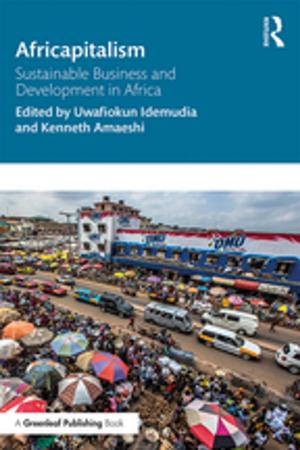Water Resources in Jordan
Evolving Policies for Development, the Environment, and Conflict Resolution
Nonfiction, Science & Nature, Technology, Environmental, Nature, Environment, Ecology| Author: | ISBN: | 9781136523953 | |
| Publisher: | Taylor and Francis | Publication: | September 30, 2010 |
| Imprint: | Routledge | Language: | English |
| Author: | |
| ISBN: | 9781136523953 |
| Publisher: | Taylor and Francis |
| Publication: | September 30, 2010 |
| Imprint: | Routledge |
| Language: | English |
This is the first comprehensive, multi-disciplinary book to address water policy in Jordan. Edited by the former Minister of Water and Irrigation of Jordan, with contributions by other prominent Jordanian and international water professionals, this volume covers such areas as the population-water resources equation in Jordan; institutional and legal frameworks; the data systems used for the assessment and formulation of water policy; water allocations and uses in municipal, industrial, and agricultural sectors; social and environmental issues; and water conflict with Jordan's neighbors. The book is a must for readers interested in Middle East politics and the critical nature of water issues in the region. The book notes the importance of interaction with the outside world to augment water resources through trade, making the experience of Jordan relevant to other developing regions where water is scarce. It introduces the term 'shadow water' to mean the scarce indigenous water resources that the import of agricultural and industrial commodities saves or replaces. The book shows how financially profitable it can be to treat water as a tradable commodity, to be exchanged peaceably across international borders. Haddadin and his distinguished contributors bring the water conflicts between Jordan and its neighbors, Israel and Syria, into sharp focus. The book includes a historical perspective on the development of water policies in Jordan and explores the significance of water in the religious, social, and political life of the country.
This is the first comprehensive, multi-disciplinary book to address water policy in Jordan. Edited by the former Minister of Water and Irrigation of Jordan, with contributions by other prominent Jordanian and international water professionals, this volume covers such areas as the population-water resources equation in Jordan; institutional and legal frameworks; the data systems used for the assessment and formulation of water policy; water allocations and uses in municipal, industrial, and agricultural sectors; social and environmental issues; and water conflict with Jordan's neighbors. The book is a must for readers interested in Middle East politics and the critical nature of water issues in the region. The book notes the importance of interaction with the outside world to augment water resources through trade, making the experience of Jordan relevant to other developing regions where water is scarce. It introduces the term 'shadow water' to mean the scarce indigenous water resources that the import of agricultural and industrial commodities saves or replaces. The book shows how financially profitable it can be to treat water as a tradable commodity, to be exchanged peaceably across international borders. Haddadin and his distinguished contributors bring the water conflicts between Jordan and its neighbors, Israel and Syria, into sharp focus. The book includes a historical perspective on the development of water policies in Jordan and explores the significance of water in the religious, social, and political life of the country.















